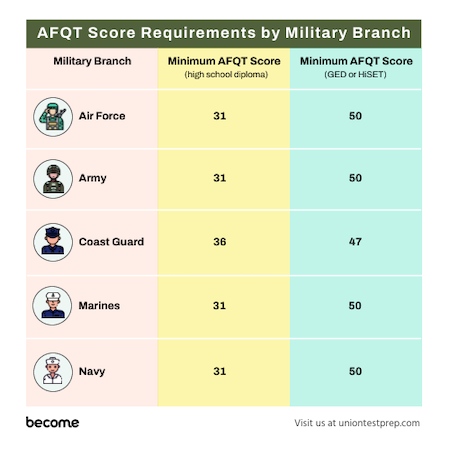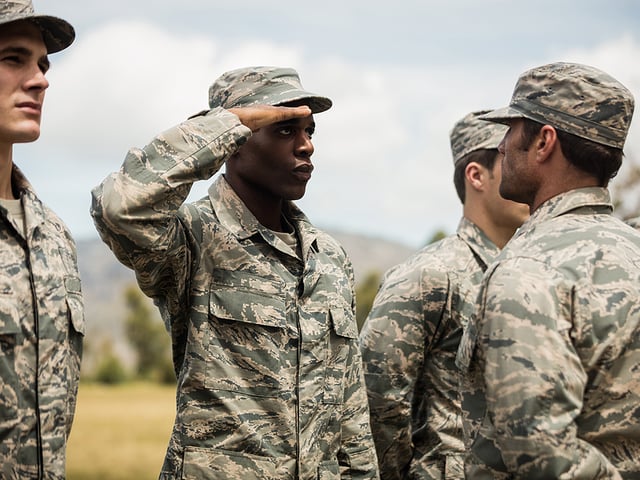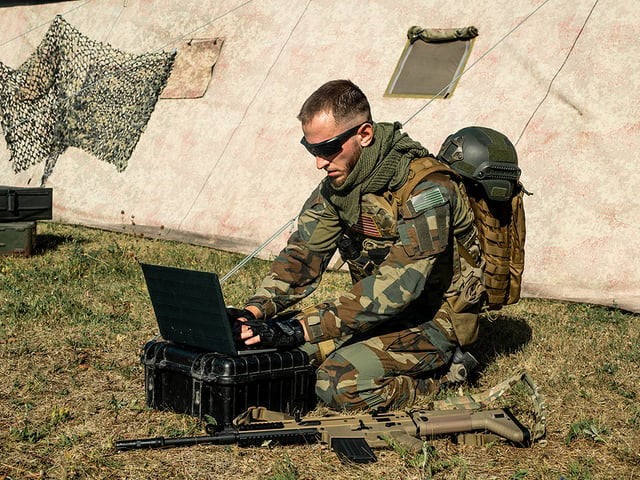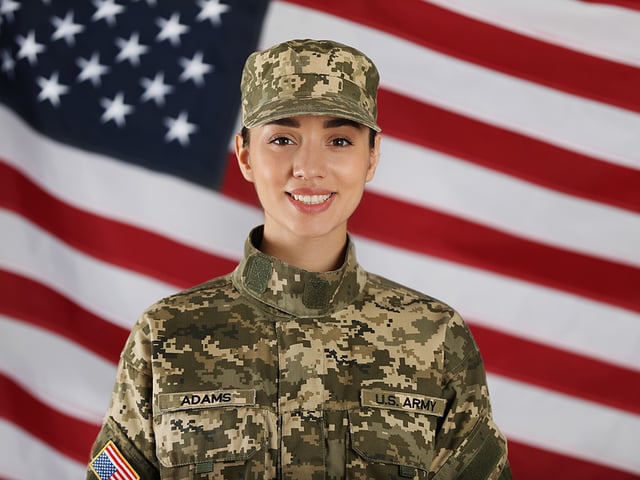
Minimum ASVAB (AFQT) Score for each Branch of the Military
To serve in the United States Armed Forces, applicants must take the Armed Services Vocational Aptitude Battery, commonly known as the ASVAB. The ASVAB is not an intelligence test; rather, it aims to assess an applicant’s abilities and fit for certain military and civilian jobs.
The test measures competency in 9 different subjects, which include General Science, Electronics Information, Auto and Shop Information, Mechanical Comprehension, Assembling Objects, Word Knowledge, Paragraph Comprehension, Arithmetic Reasoning, and Mathematics Knowledge. These last four sections— Word Knowledge, Paragraph Comprehension, Arithmetic Reasoning, and Mathematics Knowledge are the most important, as they make up something called the AFQT (Armed Forces Qualifications Test). An applicant’s AFQT score is what determines whether or not they are able to serve in the military at all, as each branch has minimum scores for enlistment.
ASVAB Minimum Scores By Branch
With minimal exceptions, all military applicants must have a high school diploma or equivalent degree, such as the GED or HiSET. The TASC was previously accepted until it was discontinued in December 2021. Current requirements are as follows:
Air Force Minimum ASVAB Score
The Air Force requires a minimum AFQT score of 31. A score of 50 is required if an applicant has a high school equivalency degree (GED or HiSET) but has not completed at least 15 hours college credit.
Army Minimum ASVAB Score
The Army requires a minimum AFQT score of 31. A score of 50 is required for an applicant holding a high school equivalency degree (GED or HiSET).
Coast Guard Minimum ASVAB Score
The Coast Guard requires a minimum AFQT score of 40. Those holding a high school equivalency degree (GED or HiSET) need a score of at least 47 and should have at least 15 hours of college credit.
Marines Minimum ASVAB Score
The Marine Corps require a minimum AFQT score of 31. A minimum score of 50 is required for an applicant holding a high school equivalency degree (GED or HiSET).
Navy Minimum ASVAB Score
The Navy requires a minimum AFQT score of 31. Those holding a high school equivalency degree (GED or HiSET) need a score of at least 50 and should have at least 15 hours of college credit. To increase recruitment numbers, in 2022 the Navy began piloting a program that allowed for those scoring in the 10th to 30th percentile on their ASVAB to qualify for enlistment, as long as minimum line scores are met. Current line score requirement include any of the following:
- GS+MC+EI=170
- VE+MK+MC+CS=220
- VE+AR=110 MC=50
The program is set to be re-evaluated at the end of fiscal year 2023.

Minimum ASVAB Score Waivers
Unique and desirable skill sets, such as fluency in a foreign language, may exempt applicants from AFQT minimums. A waiver may also be issued for high composite scores that correlate to an in-demand job. For example, if there is a shortage of Army Electricians and the applicant scores very high on the Electronics Information section, a waiver may be obtained if they agree to take a job as an electrician.
If you are looking into joining the military or are facing the ASVAB, it is a good idea to talk to a recruiter to get the most accurate and up-to-date information for your situation.
How to Improve ASVAB Scores
Because of ASVAB minimum requirements, doing poorly on the ASVAB might mean missing out on the military job (or even the entire military branch!) you want. While you can retake the ASVAB without penalty, waiting periods can make the process drag on. The best way to get a good ASVAB score the first time, or to improve your score on a retake, is to study. Taking ASVAB practice tests, reviewing ASVAB flashcards, and reading ASVAB study guides can help you determine what kind of shape you’re in for test day. If you find yourself struggling in math, it may be helpful to review basic concepts or memorize common ASVAB math formulas. Review the fundamentals of English so the Paragraph Comprehension and Word Knowledge sections seem less daunting. Make sure you get plenty of sleep before test day, and if all else fails, don’t panic! If you are stuck on a question try to eliminate as many answers as you can so your odds of a correct answer go up. And if you really have no idea, guess something anyway—there is no penalty for guessing, and a 25% chance of a correct answer is better than 0% chance of a correct answer.
Keep Reading

Armed Services Vocational Aptitude Battery Blog
What is the ASVAB Test?
The Armed Services Vocational Aptitude Battery, known as the ASVAB, is …

Armed Services Vocational Aptitude Battery Blog
Military MOS Codes
Military Occupational Specialty (MOS) codes are an integral part of the…

Armed Services Vocational Aptitude Battery Blog
U.S. Army Height and Weight Standards for Females
The U.S. Army’s commitment to maintaining a robust, physically fit, and…